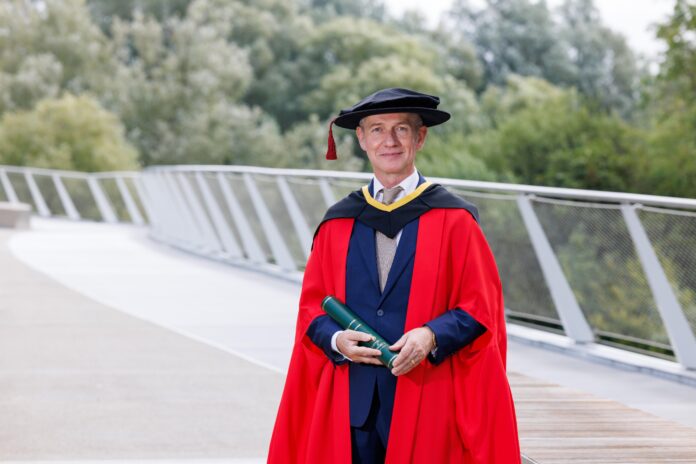
JOINING over 3,600 graduating students as a part of the University of Limerick’s (UL) autumn conferring ceremonies, Grammy-winning musician turned doctoral graduate Iarla Ó Lionáird describes his collegiate journey as “a great adventure”.
Originally from an Irish-speaking region of West Cork, the freshly minted Dr Ó Lionáird’s unique Sean Nós singing style has taken him to iconic stages worldwide, including Carnegie Hall and the Sydney Opera House.
He may be best known for his work with iconic international music groups like The Gloaming and Afro Celt Sound System.
Iarla’s educational journey in UL began back in 2003 when he completed a Masters in Ethnomusicology during a break from touring with Afro-Celt Sound System.
“My relationship with UL started on a personal level through Mícheál Ó Súilleabháin, the founder of UL’s Irish World Academy of Music and Dance, because we had been performing concerts together, him on piano and me singing, something we continued to do right up until his death,” Iarla said.
The Irish World Academy of Music and Dance, academy founded in 1994, has become a leading institution in Irish music research, no better place for a pioneering Irish musician.
“So that brought me in, his (Ó Súilleabháin) vision that people of my background and from within the oral musical tradition could have access to the Academy, could be given parity of esteem – intellectually, aesthetically, artistically, and could be acknowledged as artists and masters in their own right,” he said.
“Compared to other educational entities, I think the Irish World Academy has a definitive philosophical stance rooted in a broader equality. And I found that very attractive, I must say.”
Juggling his PhD with a thriving music career was challenging, but Dr Ó Lionáird emphasised the value of self-examination in his research.
He said doctoral work “involves the evolution of ideas that really can’t be hurried, because you don’t necessarily find them in a book, you must find them in yourself”.
Influenced by his mother and grandmother, both traditional singers, Iarla made his first public performance at the age of five.
By 12, he had already recorded the traditional classic “Aisling Gheal” with Gael Linn Records, marking the beginning of an extraordinary journey that would take him to some of the world’s most prestigious stages.
His father, a principal and educator in his own time, “luxuriated” in Iarla’s successes before his death earlier this year, he says, recalling a poignant exchange between them.
“When I handed in my doctoral study in January, my dad rang me. He actually passed away that same month, but he rang and said ‘A Dhoctúir’ (Doctor). I said, ‘you’re jumping the gun’. ‘No’, he said, ‘the work is done’.”
“I feel proud that he knew that I was finished,” he said.
“That was one of the greatest feelings I have to say, that Dad knew I’d finished it, but also that I had finished it myself.”


